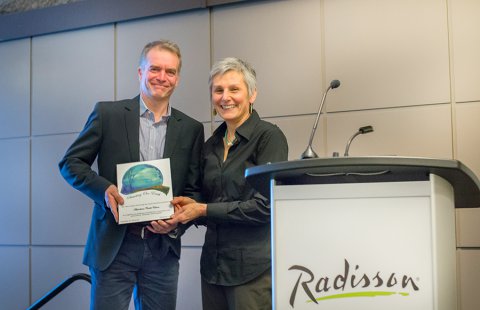Since the early days of the Network, through the creation of the International Committee in 2007 and continuing today, CCEDNet has been an active partner in international movement building, learning and representation. 2013 was no exception. Here is an overview of activities that CCEDNet was directly or indirectly involved in over the last year.
World Social Forum (WSF) in Tunisia and the African SSE network
 In partnership with the Uniterra program, I attended the WSF in Tunisia (March 26 to 30). Since CCEDNet is also a member of Intercontinental Network for the Promotion of Social Solidarity Economy (RIPESS) North America, the participation at this event was prepared with RIPESS Europe and with RAESS (RIPESS Africa). Ten workshops were organised, reports and press releases were prepared. Maude Brossard from the Chantier de l’économie sociale du Québec, also a RIPESS member, was also very involved in the process, including workshops in Tunis. The WSF was an occasion to deepen links with other Québec and Canadian organisations, in particular people from the Union movement. Read more here.
In partnership with the Uniterra program, I attended the WSF in Tunisia (March 26 to 30). Since CCEDNet is also a member of Intercontinental Network for the Promotion of Social Solidarity Economy (RIPESS) North America, the participation at this event was prepared with RIPESS Europe and with RAESS (RIPESS Africa). Ten workshops were organised, reports and press releases were prepared. Maude Brossard from the Chantier de l’économie sociale du Québec, also a RIPESS member, was also very involved in the process, including workshops in Tunis. The WSF was an occasion to deepen links with other Québec and Canadian organisations, in particular people from the Union movement. Read more here.
Maude and I were able to attend the 2nd meeting of the Réseau africain d’économie sociale et solidaire (RAESS), the RIPESS continental organisation for Africa. This meeting, held March 24-25, in Hammamet (about 60 km form Tunis) was a great opportunity to develop closer ties with African colleagues involved in RIPESS.
 CCEDNet participation at the WSF was possible because of the partnership with Uniterra (a joint CECI and WUSC) program.
CCEDNet participation at the WSF was possible because of the partnership with Uniterra (a joint CECI and WUSC) program.
Mission to Guinea
Also as part of the Uniterra program, I agreed to a one-week mission in Guinea (a Western African country whose capital is Conakry) from March 18 to 23, just before the WSF. In part, this was follow-up to a mission of two people from Guinea who came to Quebec and Acadian regions in 2012. At that time, I had accompanied this mission on behalf of CCEDNet. For example, there were visits to projects of the Microfinance Mutual in Guinea. This Mutual is in partnership with the new Mutuelle de microfinance (Québec). Seeing in person the situation in one of the poorest countries in the world is useful. Also interesting to see the presence of Canadian Corporations such as Rio Tinto and Alcoa. Guinea has 2/3 of world reserves of bauxite.
Webinars on International Themes
The Microfinance webinar (in March) was quite successful. There were two, one in English and one in French. The example of the Mutuelle de la Microfinance MECEPAG in Guinea (in coastal fishing communities) and the Mutuelle de Microfinance (Québec) proposed by the Fonds d’Emprunt Québec (the community loan fund in Québec City). The Québec National Assembly had unanimously adopted this law in December 2012. There are many similarities between microfinance in the South and in the North, when practiced in a collective manner, with full involvement of the clients / members.
Centre de la Francophone des Amériques Project on the Social Solidarity Economy (SSE)
 CCEDNet and the Chantier de l’économie sociale were official partners of the Centre in a meeting held in Haiti last May to examine the possibility of organising networking on the SSE, mainly through knowledge exchange, websites, and participation in different events. The purpose is to promote SSE as a tool in French speaking communities, in particular for those in minority situations. CCEDNet and the Centre are looking at ways or formalising collaborations for work both within the Canada and in the rest of the francophone communities of the Americas (about 33 million people are French, or French speaking).
CCEDNet and the Chantier de l’économie sociale were official partners of the Centre in a meeting held in Haiti last May to examine the possibility of organising networking on the SSE, mainly through knowledge exchange, websites, and participation in different events. The purpose is to promote SSE as a tool in French speaking communities, in particular for those in minority situations. CCEDNet and the Centre are looking at ways or formalising collaborations for work both within the Canada and in the rest of the francophone communities of the Americas (about 33 million people are French, or French speaking).
Quartiers du Monde International Conference in Paris
Ethel Côté, a member of the International Committee, was invited by this International women’s organisation to a conference in Paris last Spring as specialist on SSE. Ethel was officially a CCEDNet delegate. Ethel is continuing work within this organisation.
Second Social Forum on Solidarity Economy
 Since both RIPESS Board members at that time for North America, Nancy Neamtan and Emily Kawano, were not available, I agreed to represent RIPESS North America at this meeting in Santa Maria, Rio Grande do Sul, in the south part of Brazil. Two youth delegates close to the Chantier were also at the meeting held in July (7 to 10). I presented the history of RIPESS movement from 1997 to today in a plenary session. The meeting was an occasion to know better Paul Singer, the Brazil Federal government Secretary of State for Solidarity Economy. The international presence from RIPESS (one each from Asia, Africa, Latin America, Europe and North America) was useful for the organisation to make this event truly international. Interestingly, in South America, Solidarity Economy is the name in use. Nobody uses SSE, except at the continental level (RIPESS LAC-Latin America and Caribbean).
Since both RIPESS Board members at that time for North America, Nancy Neamtan and Emily Kawano, were not available, I agreed to represent RIPESS North America at this meeting in Santa Maria, Rio Grande do Sul, in the south part of Brazil. Two youth delegates close to the Chantier were also at the meeting held in July (7 to 10). I presented the history of RIPESS movement from 1997 to today in a plenary session. The meeting was an occasion to know better Paul Singer, the Brazil Federal government Secretary of State for Solidarity Economy. The international presence from RIPESS (one each from Asia, Africa, Latin America, Europe and North America) was useful for the organisation to make this event truly international. Interestingly, in South America, Solidarity Economy is the name in use. Nobody uses SSE, except at the continental level (RIPESS LAC-Latin America and Caribbean).
Social Enterprise World Forum
 Even if the international aspect for CCEDNet was not predominant at the Social Enterprise World Forum held in Calgary this past October, the CCEDNet reception and meetings with Bob Massie from the New Economy Coalition were very useful to build relationships within North America. Watch Bob’s powerful talk.
Even if the international aspect for CCEDNet was not predominant at the Social Enterprise World Forum held in Calgary this past October, the CCEDNet reception and meetings with Bob Massie from the New Economy Coalition were very useful to build relationships within North America. Watch Bob’s powerful talk.
Pat Conaty from the UK, co-author of the book The Resilience Imperative with Mike Lewis, was also in Calgary. I enjoyed meeting with him and catching up – last time was in 2004. Pat is with the New Economics Foundation (NEF).
Networking with New Economy Coalition (US) and New Economics Foundation (UK)
CCEDNet Executive Director Mike Toye met Bob Massie, the New Economy Coalition (NEC) President in Boston last June. Subsequently, considering many similarities in the vision and work of NEC and of CCEDNet, the CCEDNet Board agreed to accept the invitation made in June to join NEC. Since NEC and NEF are collaborating a lot, we are now in closer ties and we are involved in sharing on-line, and attending webinars organised by NEC.
RIPESS: 5th Global Meeting, RIPESS North America, RIPESS Board of Directors
 Mike Toye, Ethel and I attended the 5th Global Meeting in Manila (October 14-18). CCEDNet founding member Mike Lewis was also invited as keynote speaker for the opening plenary. There were also 6 people from the Chantier and 4 from the US Solidarity Economy Network (SEN). Since it was agreed to alternate between Quebec organisations and CCEDNet on the RIPESS Board, CCEDNet has agreed to accept this responsibility for the next 4 years, with the Board appointing me to this role. For the past mandate, Nancy Neamtan was on the Board as the second representative for RIPESS North America alongside Emily Kawano from US SEN. Emily is continuing for the next years.
Mike Toye, Ethel and I attended the 5th Global Meeting in Manila (October 14-18). CCEDNet founding member Mike Lewis was also invited as keynote speaker for the opening plenary. There were also 6 people from the Chantier and 4 from the US Solidarity Economy Network (SEN). Since it was agreed to alternate between Quebec organisations and CCEDNet on the RIPESS Board, CCEDNet has agreed to accept this responsibility for the next 4 years, with the Board appointing me to this role. For the past mandate, Nancy Neamtan was on the Board as the second representative for RIPESS North America alongside Emily Kawano from US SEN. Emily is continuing for the next years.
UN Inter-Agency workgroup on SSE
 By far, one of the main breakthroughs for RIPESS has been formal recognition from different UN Agencies of the SSE as an important alternative, and RIPESS as an organisation is recognised. This started in 2009 with work at the International Labor Organisation (ILO). In May 2013, UNRISD (United Nations Research Institute on Social Development) held a two-day Seminar on SSE in Geneva. Many people from RIPESS spoke at the event. This was a very significant step. This was followed up in September by the creation of a UN Inter-Agency workgroup on SSE. Besides UNRISD, the FOA, UNDP, NGLS are members. RIPESS now has official Observer status. At the same time, SSE was introduced and recognized as an important approach by International NOG’s for the UN post 2015 Sustainable Development Goals. Last September 25, Daniel Tygel, the RIPESS operations manager, gave a 5-minute presentation at the UN in front of 1200 participants. He was one of the 35 speakers. This is certainly the first time that SSE is mentioned at the UN itself.
By far, one of the main breakthroughs for RIPESS has been formal recognition from different UN Agencies of the SSE as an important alternative, and RIPESS as an organisation is recognised. This started in 2009 with work at the International Labor Organisation (ILO). In May 2013, UNRISD (United Nations Research Institute on Social Development) held a two-day Seminar on SSE in Geneva. Many people from RIPESS spoke at the event. This was a very significant step. This was followed up in September by the creation of a UN Inter-Agency workgroup on SSE. Besides UNRISD, the FOA, UNDP, NGLS are members. RIPESS now has official Observer status. At the same time, SSE was introduced and recognized as an important approach by International NOG’s for the UN post 2015 Sustainable Development Goals. Last September 25, Daniel Tygel, the RIPESS operations manager, gave a 5-minute presentation at the UN in front of 1200 participants. He was one of the 35 speakers. This is certainly the first time that SSE is mentioned at the UN itself.
Links with Chantier International Committee
Close ties are kept with the International Committee of the Chantier de l’économie sociale. We share information and collaborate on many issues.
Prospects for 2014
At the international level, work on post 2015 Sustainable Development Goals (SDG) is very intensive, since the UN General Assembly will be adopting the SDG’s in the next session later this year. Since there are now possibilities for work with UN Agencies, this is important for the movement.
Even more important is the adoption by the UN, and afterwards implementation by all countries of the world, of the SDG’s.
Since CED, Social Solidarity Economy, and other alternative approaches are at the heart of a people-centred and sustainable world, our objectives are clear, the opportunities are there, but the challenges are awesome, especially for us in the North American context. We already know that the average temperature of our planet will increase by 2 degrees. We must take drastic action to prevent a worsening situation.
It is within this context that the International Committee will continue its work, in particular in the movement building and in the advocacy work, both within Canada, within North America and in the world.
For RIPESS, the next steps are participating in the Inter-Agency workgroup. In our movement itself, the RAESS (RIPESS Africa) just announced a meeting of the African network in Morocco next April 24-25. This will be followed by a RIPESS Board meeting on April 26-27. I will be representing CCEDNet will be at both meetings.
Next June 6-8, I and other CCEDNet members and staff are planning to attend the New Economy Coalition’s National Gathering for the New Economy Movement in Boston. If you are considering attending, let me know!
If you’d like to know more, or get involved with CCEDNet’s international activities, please contact me.
Yvon Poirier is President of CCEDNet’s International Committee and Secretary of the Board.











 5th International Meeting of Social Solidarity Economy
5th International Meeting of Social Solidarity Economy After the current public consultation, RIPESS will release the final document that will incorporate feedback received. It will then be possible for organizations and networks to endorse it, and have their names added to the recommendations. These will then be formally presented to the United Nations.
After the current public consultation, RIPESS will release the final document that will incorporate feedback received. It will then be possible for organizations and networks to endorse it, and have their names added to the recommendations. These will then be formally presented to the United Nations. In partnership with the Uniterra program, I attended the WSF in Tunisia (March 26 to 30). Since CCEDNet is also a member of Intercontinental Network for the Promotion of Social Solidarity Economy (RIPESS) North America, the participation at this event was prepared with RIPESS Europe and with RAESS (RIPESS Africa). Ten workshops were organised, reports and press releases were prepared. Maude Brossard from the
In partnership with the Uniterra program, I attended the WSF in Tunisia (March 26 to 30). Since CCEDNet is also a member of Intercontinental Network for the Promotion of Social Solidarity Economy (RIPESS) North America, the participation at this event was prepared with RIPESS Europe and with RAESS (RIPESS Africa). Ten workshops were organised, reports and press releases were prepared. Maude Brossard from the 
 CCEDNet and the Chantier de l’économie sociale were official partners of the Centre in
CCEDNet and the Chantier de l’économie sociale were official partners of the Centre in  Since both RIPESS Board members at that time for North America, Nancy Neamtan and Emily Kawano, were not available, I agreed to represent RIPESS North America at this meeting in Santa Maria, Rio Grande do Sul, in the south part of Brazil. Two youth delegates close to the Chantier were also at the meeting held in July (7 to 10). I presented the history of RIPESS movement from 1997 to today in a plenary session. The meeting was an occasion to know better Paul Singer, the Brazil Federal government Secretary of State for Solidarity Economy. The international presence from RIPESS (one each from Asia, Africa, Latin America, Europe and North America) was useful for the organisation to make this event truly international. Interestingly, in South America, Solidarity Economy is the name in use. Nobody uses SSE, except at the continental level (RIPESS LAC-Latin America and Caribbean).
Since both RIPESS Board members at that time for North America, Nancy Neamtan and Emily Kawano, were not available, I agreed to represent RIPESS North America at this meeting in Santa Maria, Rio Grande do Sul, in the south part of Brazil. Two youth delegates close to the Chantier were also at the meeting held in July (7 to 10). I presented the history of RIPESS movement from 1997 to today in a plenary session. The meeting was an occasion to know better Paul Singer, the Brazil Federal government Secretary of State for Solidarity Economy. The international presence from RIPESS (one each from Asia, Africa, Latin America, Europe and North America) was useful for the organisation to make this event truly international. Interestingly, in South America, Solidarity Economy is the name in use. Nobody uses SSE, except at the continental level (RIPESS LAC-Latin America and Caribbean). Even if the international aspect for CCEDNet was not predominant at the
Even if the international aspect for CCEDNet was not predominant at the  Mike Toye, Ethel and I attended the
Mike Toye, Ethel and I attended the  By far, one of the main breakthroughs for RIPESS has been formal recognition from different UN Agencies of the SSE as an important alternative, and RIPESS as an organisation is recognised. This started in 2009 with work at the International Labor Organisation (ILO). In May 2013, UNRISD (United Nations Research Institute on Social Development) held a
By far, one of the main breakthroughs for RIPESS has been formal recognition from different UN Agencies of the SSE as an important alternative, and RIPESS as an organisation is recognised. This started in 2009 with work at the International Labor Organisation (ILO). In May 2013, UNRISD (United Nations Research Institute on Social Development) held a 



 With the Community Enterprise Development (CED) Tax Credit, you can contribute to the growth of important community initiatives and receive a 30% tax credit on your investment.
With the Community Enterprise Development (CED) Tax Credit, you can contribute to the growth of important community initiatives and receive a 30% tax credit on your investment. 
 Community Loan Investment Funds are flexible financing tools that can be used to support community-based projects that might not qualify for traditional financing. The Jubilee Fund (CCEDNet Member) is a Winnipeg-based community investment fund that helps to finance community businesses, housing projects and social services that contribute to community well-being. How you can get involved: The Jubilee Fund offers Investment Certificates as three or five year term deposits
Community Loan Investment Funds are flexible financing tools that can be used to support community-based projects that might not qualify for traditional financing. The Jubilee Fund (CCEDNet Member) is a Winnipeg-based community investment fund that helps to finance community businesses, housing projects and social services that contribute to community well-being. How you can get involved: The Jubilee Fund offers Investment Certificates as three or five year term deposits Socially Responsible Investment Funds look for strong financial performance as well as strong social and environmental performance when selecting investments. Assiniboine Credit Union (CCEDNet Member), for example, offers its members the opportunity to invest in SRI mutual funds. They use a number of socially responsible investment strategies, including ESG analysis (the process of considering Environmental, Social and Governance factors when selecting investments), shareholder engagement and action, negative screening and community investing. Read more
Socially Responsible Investment Funds look for strong financial performance as well as strong social and environmental performance when selecting investments. Assiniboine Credit Union (CCEDNet Member), for example, offers its members the opportunity to invest in SRI mutual funds. They use a number of socially responsible investment strategies, including ESG analysis (the process of considering Environmental, Social and Governance factors when selecting investments), shareholder engagement and action, negative screening and community investing. Read more
 In a wealthy society that values the concept of working hard in order to provide for yourself and your family, it makes no sense that fully employed people in our economy still have to choose between feeding their kids or paying their rent or paying school fees or saving for any kind of emergency. People who work hard should have enough for these basic needs, and should not be forced into dangerous choices that put them and their families at risk.
In a wealthy society that values the concept of working hard in order to provide for yourself and your family, it makes no sense that fully employed people in our economy still have to choose between feeding their kids or paying their rent or paying school fees or saving for any kind of emergency. People who work hard should have enough for these basic needs, and should not be forced into dangerous choices that put them and their families at risk.